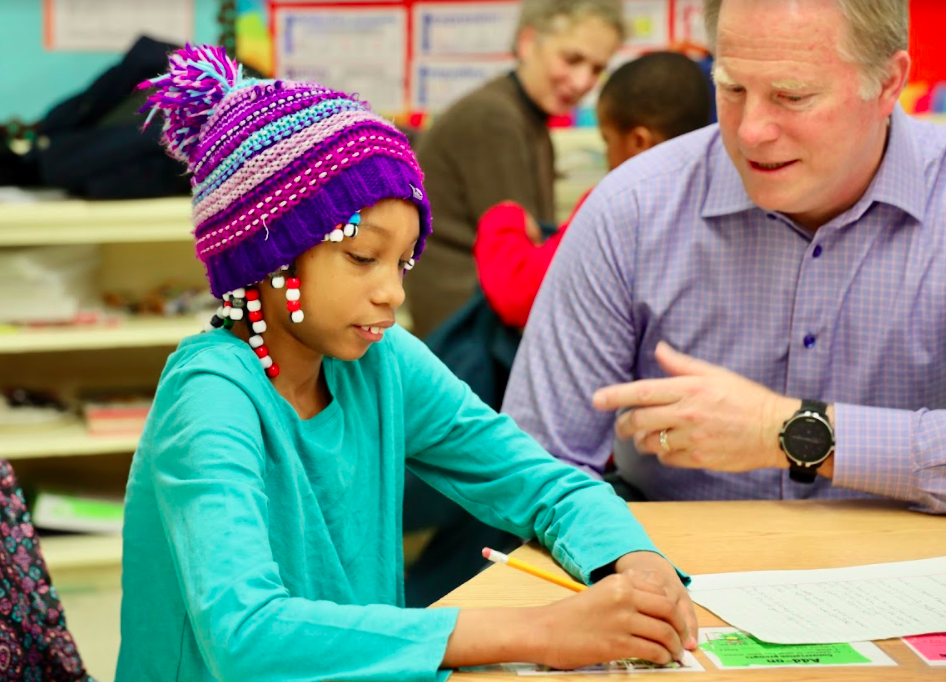
Mentor Volunteer Program Handbook
We inspire young people to cultivate their vast potential through literacy programs centered on diverse books and authors.
Time Commitment
1 school year (October-June) excluding all school breaks and holidays
Approximately 1 hour a week, ~16 hours total broken into two 8-week blocks
Program Description
Consistent adult mentorship is essential to positive child development and volunteers with Behind the Book have the rare opportunity to plug directly into the classroom to support innovative literacy programs. Volunteers commit to follow programs from start to finish in the same school community.
In just 16 hours, you could inspire as many as 50 students to more meaningfully
engage with both literature and the world around them.
WHY WE NEED YOU
Redefine the notion of “success” by disregarding test scores as a goal in favor of student curiosity and personal motivation to learn. When adults participate alongside students, students not only see that the value of learning extends beyond grades, but also feel more confident in the classroom when they realize that not even adults have all the answers. Consistent adult support beyond paid teachers and family is essential to positive child development. A recent study of teachers showed that the consistency of mentorship has a bigger impact on success than the teaching experience of said mentor.
Mentors:
Create consistent role model figures
Show how literacy advocacy can extend into adulthood
Exhibit models of communication and empathy
Introduce the importance of being informed
The opportunity was truly fulfulling. I have not walked in to that school in over 25 years, I am so very humbled and grateful, I was reminded by my mother of the challenges she faced in trying to provide me with a quality education and was truly emotional when I spoke of your organization and what you do. From the bottom of my heart thank you, it was truly a full circle moment for me.
Volunteer Stephanie, 2019
HOW DO WE TEACH
We center student voices
We allow them to make choices about how they learn
Workshops We Offer
Introductory
Writing
Art
Author Visit
Celebration
Possible Supplementary
Field trips
Reflection workshops
Special speakers
WHERE DO WE WORK?
Manhattan, Queens, Brooklyn, and the Bronx at Title I schools where at least 60% of its students qualify for free or reduced lunch
WHAT DO WE TEACH
Topics and characters that resonate with our students’ lives
Predominantly authors of color writing about characters of color
That’s often who our students are.
Even if not, showcasing diversity is vital.
We explore topics like immigration or incarceration
We highlight topics STEM and Social Emotional learning
VOLUNTEERS MUST:
Block out time for the workshops you’re assigned to
Open our emails and communicate any concerns
Share your story
Show up as an engaged, caring mentor for students
Responsibilities by Workshop
All Workshops
Volunteers will support students in finding their own ideas
Provide individualized support
Model curiosity and vulnerability
Ask students what they would find helpful, the ways in which you can best serve them during the writing process.
If they say that they do not need assistance, move along to another student and/or let them know that you are available to help if they change their mind.

Introductory Workshop
Introduce yourselves
Hand out books
Help students with preliminary surveys about interest in reading and writing
Writing and Art Workshop
Attend to a small group of students who require consistent adult guidance or to circle the room
Answer questions or prompt them to keep them working
Help with brainstorming, getting their thoughts down on paper, or with feedback on a draft
Affirm student efforts

Author Visit Workshop
Ask author questions
Draw connections from the conversation to prior workshops.
Participate in any activities

Supplementary: Special Speaker, Field Trip, or Reflection
Special Speaker: ask special speaker questions, draw connections from the conversation to prior workshops, participate in any activities
Field trip: chaperone, draw connections to past workshops
Reflection: answer discussion questions, participate in drama activities

Celebration!
Join a celebration circle wherein the class as a whole debriefs the program
Sharing their final projects, feelings, and takeaways
Help students with final surveys about their interest in reading and writing
What To Do: Individualized Support Techniques
Even within one class, each student may need a different approach to writing support.
You Can:
Write their sentences for them as they dictate to you.
Write their sentences on a separate piece of paper and have the students copy onto their paper.
If students are more competent, encourage them to sound-spell their sentences
After sharing their sentence idea with you, have them complete their sentence starters independently.
Check for clarity. It’s okay if all the words aren’t spelled correctly, so long as it can be read phonetically.
What Not To Do
We are there to support students, not “fix” them. It is important to realize that we’re
working WITH the community, NOT MANAGING the community
Never:
Judge or assume the skill set that students have
Disparage students
Do an assignment for a student
Leave the room without notifying Behind the Book staff
Contact students outside of Behind the Book
Common Obstacles
Student Engagement Difficulties:
Disinterested, shy, distracted
SOLUTION!
Be emotive!
Talk to the kids about things relevant to them!
What’s your favorite ____, what are you interested in, etc.
Meet them at their skill level!
Younger students may not know how to write, so you write their answer on a white board for them to copy
Student Skipping Steps:
Ignoring the worksheets
SOLUTION!
Guide them through the steps, in order.
You can read aloud each section and utilize the chunking method.
Student Stumped by the Prompt:
Difficult phrasing, lack of ideas
SOLUTION!
The "Chunking" Method
The process of grouping different bits of information together into more manageable or meaningful chunks.
Consider one or a few of the 5 W’s and H questions
Who, What, When, Where, Why, and How
Talk them through with students
Student Behind on Writing:
Unfinished work or absence
SOLUTION!
Don’t backtrack unless absolutely necessary
Use the empty/incomplete graphic organizer to guide first draft writing, sentence by sentence.







